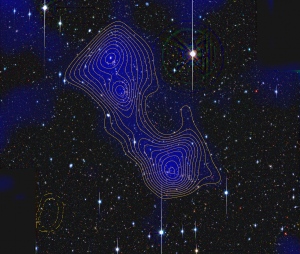Technological advances may be ushering in a new era of understanding in the search for fundamental physical particles - including dark matter - said Professor Alex Murphy of the University of Edinburgh's School of Physics and Astronomy at the AAAS meeting in Washington, D.C.
Deep space observations together with experiments far underground are hunting for dark matter - an elusive material which, together with dark energy, is thought to account for about 94 percent of the universe. You can read all about dark matter and dark energy here.
The most sensitive of these experiments is Large Underground Xenon, or LUX, detector - which is located a mile underground in South Dakota. Recent improvements have increased the device's chances of identifying sub-atomic particles called WIMPs - weakly interacting massive particles - which are believed to be the main component of dark matter.

Dark-matter filaments such as the one bridging the galaxy clusters Abell 222 and Abell 223 are predicted to contain more than half of all matter in the Universe. Credit: Jörg Dietrich, University of Michigan/University Observatory Munich.
Professor Murphy said, "Technology has enabled us to ramp up our search for this fundamental material, and its place in the physical realm."
Professor Murphy explained the research at a symposium entitled Astroparticle Physics: Understanding Mysteries of the Universe at 3 pm today at the Marriot Wardman Park, Washington DC. He was joined by Professor Angela Olinto of the University of Chicago and Professor Eun-Suk Seo of the University of Maryland.